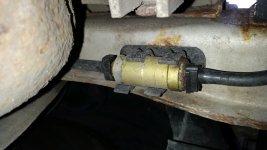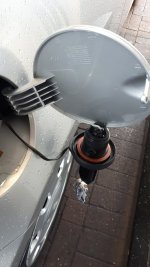There's always a lot of mystique around brake fluid... but it's fairly simple stuff.
It's main job is to transfer pressure from the brake/clutch pedal to the brake caliper or clutch. As Vexorg says, any liquid would do this job.. but some are more suitable than others. Brake fluid works because;
- It does not corrode ferrous metal;
- It has a high boiling point (typically 360C)
- It is "oily"
1. rules out water, 2. rules out antifreeze, engine oil or other fluids you might have lying around in your garage.
Brake fluid is also hygroscopic.. which is a good thing and a bad thing. It dissolves moisture in the system so any condensation etc. in there is no longer able to corrode the brake/clutch system. The capacity for brake fluid to absorb moisture is colossal but eventually the moisture will overwhelm the fluid's ability to dissolve it and the fluid becomes "watery" so that it can start to corrode the brake/clutch system.
Some brake fluids (DOT5, as distinct from DOT 5.1) do not absorb moisture.. and can suffer from water "droplets" in the fluid .. which usually settle in some nook of brake pipe and can then corrode that spot... but DOT3, DOT4 and DOT5.1 dissolve water.
The biggest PITA with dissolved water is that when your brakes (clutch not so much) get hot, they can reach 160-200C .. that makes the water dissolved in the fluid boil. The boiling water releases vapour and then you get "air bubbles" in the system, which degrades the pedal performance (spongey brakes and maybe a big accident, since brakes don't get to 200C just visiting Sainsbury's).
Your failure (pedal not returning) sounds like a clutch slave cylinder failure.. not the clutch itself... The clutch has no contact with the fluid.
The slave contains neoprene seals, which can harden up, or fold in as the piston/rod moves through them and therefore "leak". It's unlikely to be caused by old fluid.. although any corrosion on the piston will cut the seals, as jr says. But the slave seals are 5-6 years old and low mileage .. so maybe the car has done a lot of town use (which means changing gear a lot, and a lot of piston-to-seals action). In addition, the rubber boot over the piston may have perished a bit and has let dirt/moisture into the rod, corroded the rod from the outside side.. and that "grit" has cut the slave seals. My bet is more the latter, since it's outside the car.
Anyhow, change the slave (you may see a leak of fluid dripping down the front of the gearbox) and put all new DOT4 in the clutch circuit (small pot on the left of the engine bay) ... and while you're there... change the brake fluid as well. It'll take a young fella with a rubber tube and a milk bottle aboot 20mins.
Ralf S.
 ) and some forums say that the clutch fluid should be changed every 2-3 years. I am unsure what to believe?
) and some forums say that the clutch fluid should be changed every 2-3 years. I am unsure what to believe?


